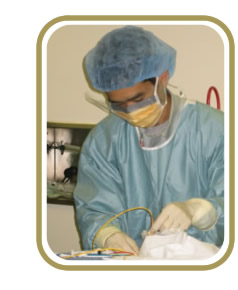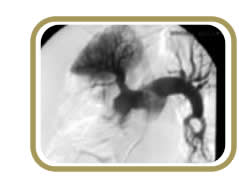Pulmonary Hypertension
Translational-Clinical Research
Pulmonary hypertension is a complex disorder with significant effects on morbidity and mortality. It is of paramount importance to gain greater understanding of the mechanisms responsible for disease pathogenesis in these patients to provide more comprehensive treatment options. The mission of the Pulmonary Hypertension Center at Boston Medical Center (Boston University School of Medicine) is to improve the lives of persons living with pulmonary hypertension by providing state-of-the-art patient care coupled with innovative research aimed at understanding the pathogenesis and natural history of pulmonary hypertension. This center is the clinical repository for ongoing basic science, translational, and clinical studies on pulmonary hypertension. Our research group interacts with our clinical Pulmonary Hypertension Center in a highly integrated approach to advancing knowledge and treatment of this disease.

Background:
Pulmonary arterial hypertension (PAH), defined as a mean pulmonary artery pressure of >25 mm Hg at rest, a PCWP or LVEDP <15, and PVR > 240 dynes/cm-5 (3 Wood units), can occur rarely in isolation [idiopathic pulmonary arterial hypertension (IPAH)] but much more commonly in association with other diseases such as connective tissue diseases, HIV infection, portal hypertension and hemoglobinopathies. Little is known regarding the pathogenesis of these disorders. As many share similar histologies, it is possible that common pathophysiologic mechanisms link these disorders. The goal of our research group is to establish patient cohorts with different forms of PAH to study clinically and pathologically. Clinical projects within the group focus on disease outcomes, treatment and prognosis. Basic science and translational research projects focus on the use of genetic resources and biomarkers to identify novel molecules for further investigation.
Current research projects and clinical trials in our center include:
-
- Association of specific genetic modulations in the pathogenesis of PH associated with systemic sclerosis
- Understanding the roles of pulmonary vascular modulators (sleep-disordered breathing and venous thromboembolism) in the endothelial dysfunction of PH in sickle cell disease
- Understanding the impact of co-existent interstitial lung disease on clinical outcomes in patients with pulmonary hypertension related to systemic sclerosis
- Origins of Pulmonary Vasculature: Single Cell Sequencing and Lineage Tracing of Pulmonary Vasculature in Development.
- Health services research on the potential misuse of PAH therapies for Group 2 and 3 PH within the VA medical system
- Clinical trials in pulmonary arterial hypertension
Principal Investigators:

- Elizabeth S. Klings, MD, Associate Professor of Medicine, Director, Pulmonary Hypertension Center, Director, Center for Excellence in Sickle Cell Disease
- Renda Wiener, MD, MPH, Associate Professor of Medicine, Acting Associate Director, Center for Healthcare Organization & Implementation Research
- Edith Nourse Rogers Memorial VA Hospital
- Jason Rock, PhD, Associate Professor of Medicine/Pulmonary/CReM
- Robert Simms, MD, Section of Rheumatology
- Maria Trojanowska, PhD, Section of Rheumatology
Post-Doctoral Fellows:
- Noah Schoenberg, MD
- Stephanie Hon, MD
- Kari Gillmeyer, MD
- Kate Steinberg, MD
Research Coordinators:
- Kim Tobin-Finch
- Eric Stratton
Selected Publications:
- Klings ES, Machado RF, Barst RJ, Morris CR, Mubarek K, Gordeuk VR, Kato GJ, Ataga KI, et al. An Official ATS Clinical Practice Guideline: Diagnosis and Treatment of Pulmonary Hypertension of Sickle Cell Disease. Am J Resp Crit Care Med 2014; 189: 727-740.
- .Morris CR, Kim HY, Klings ES, Wood J, Porter JB, Trachtenberg F, Sweeters N, Olivieri NF, Kwiatkowski JL, Virzi L, Hassell K, Taher A, Neufeld EJ, Thompson AA, Larkin S, Suh JH, Vichinsky EP, Kuypers FA. Dysregulated arginine metabolism and cardiopulmonary dysfunction in patients with thalassemia. Br J Haematol 2015; 169(6):887-98.
- Rock J.R., Barkauskas C.E., Cronce M.J., Xue Y., Harris, J.R., Liang J., Noble P.W., and Hogan B.L.M. 2011. Multiple stromal populations contribute to pulmonary fibrosis without evidence for epithelial-to-mesenchymal transition. Proc Natl Acad Sci USA. 108(52):E1475-83. PMCID: PMC3248478.
- Weir NA, Saiyed R, Alam S, Conrey A, Desai HD, George MP, Keeley JH, Klings ES, Mehari A, Taylor JG 6th, Minniti CP, Kato GJ. Prostacyclin-Analog Therapy In Sickle Cell Pulmonary Hypertension. Haematologica 2017;102:E163-E165.
- Worsham CM, Martin ST, Nouraie SM, Cohen RT, Klings ES. Clinical and Laboratory Findings Associated with Sleep Disordered Breathing in Sickle Cell Disease. Am J Hematol 2017;92:E649-E651.
- Gillmeyer KR, Lee MM, Link AP, Klings ES, Rinne ST, Wiener RS. Accuracy of algorithms to identify pulmonary arterial hypertension in administrative data: a systematic review. 2018 (manuscript under review)
- Kim D, Lee KM, Freiman MR, Powell WR, Klings ES, Rinne ST, Miller DR, Rose AJ, Wiener RS. Phosphodiesterase-5 Inhibitor Therapy for Pulmonary Hypertension in the United States. Actual versus Recommended Use. Ann Am Thorac Soc. 2018;15(6):693-701.
- Wiener RS, Ouellette DR, Diamond E, Fan VS, Maurer JR, Mularski RA, Peters JI, Halpern SD. An official American Thoracic Society/American College of Chest Physicians policy statement: the Choosing Wisely top five list in adult pulmonary medicine. Chest. 2014;145(6):1383-91.
- Rice LM, Mantero JC, Stratton EA, Warburton R, Roberts K, Hill N, Simms RW, Domsic R, Farber HW, Layfatis R. Serum biomarker for diagnostic evaluation of pulmonary arterial hypertension in systemic sclerosis. Arthritis Res Ther. 2018 Aug 16;20(1):185.